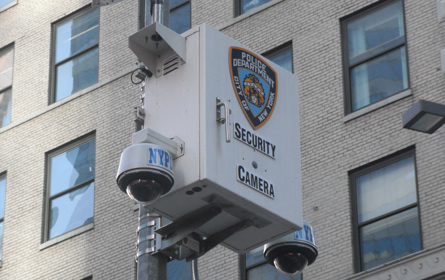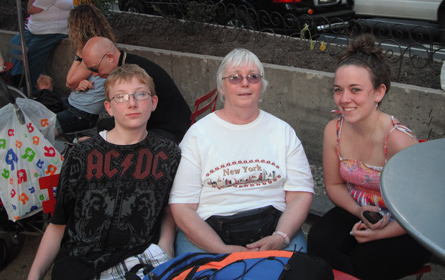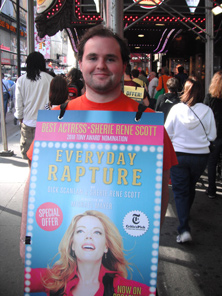
There are 82 police cameras and others cameras from stores trained on the streets in and around Times Square -- not to mention thousands in the hands of tourists -- but none of them seems to have picked up an image of Faisal Shahzad who is in custody for trying to set off a big homemade car bomb at the height of the theater rush May 1. The video most circulated by police of a suspect showed a white man changing his shirt on the sidewalk near the SUV packed with explosives. Lucky for him, a mob didn't find him and tear him limb from limb.
The bombing was averted that night due to conscientious community-minded vendors who contacted police as they often do when they spot something suspicious -- especially difficult in a district full of eccentricity. Shahzad was apprehended through good, old-fashioned police work -- tracking this bumbling would-be terrorist through identifiers on the vehicle that he had recently purchased.
Nevertheless, the early response of Mayor Michael Bloomberg, police and at least one editorial board to this incident was to call for more high-tech security. While most public officials seem to support that idea, a few critics have questioned the efficacy of such a system and the effects it would have on privacy and on our basic civil liberties.
Expanding the 'Ring'
New York is already in the process of blanketing the financial district with a "ring of steel" surveillance system modeled on London's. Now it wants to extend that to Times Square.
The system includes "cameras, sensors and analytical software," AFP reported, that, according to Police Commissioner Ray Kelly would trigger alarms when it "noticed an unattended bag or car circling a block too many times to be considered normal."
"Every public nook and cranny of midtown Manhattan should be covered by an integrated network of supersharp digital cameras that are monitored in real time,” the Daily News wrote in an editorial. "The only obstacle is money -- which actually should be no object given that lives are at stake." It will cost an estimated $110 million to expand the downtown system into Times Square.
Security vs. Freedom
Public officials are not oblivious to the concern about civil liberties. Speaking at a joint press conference in London with Mayor Boris Johnson shortly after the Times Square incident, Bloomberg said expanded surveillance "is controversial, but we have to make a balance between civil liberties and protection. We live in a very dangerous world."
Johnson, whose Underground system alone has 12,000 closed circuit TV cameras (to New York's 4,300, only half of which work), said, "Of course everybody understands the civil liberties arguments and the concerns, and they're very, very strong in this city and country, just as they are in New York."
Civil libertarian Bill Dobbs worries that the cameras are another sign that we are slowly giving up our basic rights. "All searching people does is get people used to the idea of being stopped and searched. We're getting to the point where when someone resists this, the public will wonder what they're hiding," he said.
Dobbs added, "Now, everything and everybody is under suspicion; some simply because of their race or religion suffer even more police and public scrutiny. ... We are continually pushed to give up cherished freedoms to fight an unseen enemy."
Sahid Buttar, executive director of the Bill of Rights Defense Committee, raised similar issues. "While surveillance is in some ways the antithesis of profiling (surveillance is broad and limitless, whereas profiling seems focused and targeted), both government practices offend the same constitutional principle of individualized suspicion inherent in the First and Fourth Amendments," he wrote.
Do They Work?
Dobbs also questions the effectiveness of the plan. "The [Metropolitan Transportation Authority] put up cameras in the 1980s but gave up on them because they couldn’t monitor them," he said. "Technology provides false hope."
In light of the various concerns, the expansion of the ring of steel needs more discussion and review, said Donna Lieberman, executive director of the New York Civil Liberties Union.
"National security and warding off terrorism are enormously vital jobs and we all hope the police department is doing it well -- fantastically, in fact. To do it right, we have to not simply accept at face value every proposal put forward because it ought to work. The City Council and the mayor have to use the same high standards they put on other areas of government on the police department and its security effort," she said.

While she acknowledges "cameras can be helpful," she said New Yorkers need to "demand more than just assertions that they will do the job," particularly in the current economic climate.
The proliferation of cameras and images is “creating a big haystack of information and we're looking for needles," Lieberman said. "We need to be strategic in our surveillance."
And she noted that, in the case of the attempted bombing in Times Square "it was the alertness and civic mindedness of ordinary people and police" that led to a resolution of the incident.
Fate of the Footage
So far, the administration has not said what it will do with the information and images it collects with its surveillance cameras. This bothers Lieberman.
She believes adequate safeguards do not currently exist to protect people against the improper use of their images. And she said that the "potential for abuse is more than imagined," starting with the potential for identity theft if the information is compromised.
Example of possible abuses abound. CBS News recently did an expose on how photocopy machines memory cards store tens of thousands of images of documents that are not wiped clean when the machine is sold secondhand. One of the machines in CBS's investigation had police records from Buffalo, another medical records from a hospital.
In an example closer to home, Kelly has said the police department plans to createthe city police maintain a searchable database of the hundreds of thousands of innocent New Yorkers -- mostly African American and Latino young men -- who are stopped and frisked every year. City Council Speaker Christine Quinn and Councilmember Peter Vallone, Jr., chair of the Public Safety Committee have written to Kelly expressing concern that such a retention of records would violate the spirit of the law mandating that criminal records be sealed. Quinn told me on May 17 that the council and police department staffs were in the process of setting up meetings about the matter.
The civil liberties union filed a class action lawsuit on May 19 to stop the police from keeping this database of innocent people. The police department has stopped and frisked 3 million people since 2004 and 575,000 just last year, a record. About 80 percent were African American and Latino.
Two of the plaintiffs tell their stories in a short film. Clive Lino, 30, an African American Harlem resident who works with special needs kids, was stopped "at least 13 times by NYPD officers between February 2008 and August 2009," but never was guilty of anything, the NYCLU said in a release. "They make me feel like a criminal or suspect when I haven’t done anything wrong," Lino said in the release.
"Innocent New Yorkers who are the victims of unjustified police stops should not suffer the further injustice of having their personal information shared indefinitely in a sprawling NYPD database” that may contain the names of more than 100,000 innocent New Yorkers, Lieberman said.
In general, Lieberman wants to require government to do "a privacy impact statement" when it seeks to expand surveillance. But trying to get information out of the government agencies that do this work -- from the New York Police Department to the FBI -- is "like trying to take blood from a stone," she said.
The police department did not respond to an e-mail request for comment on any of these issues. In the past, its spokespeople have deflected questions about security measures by citing security concerns. For this story, they would not answer questions about how many personnel will be needed to staff the expanded surveillance system, how long images will be kept, who will have access to them, and what evidence they have that these expensive methods are more effective than traditional police work.
Trusting the Police
Public officials I spoke with said they had few worries about the increased surveillance. Quinn said she was "confident" Kelly was conducting surveillance "in an appropriate way," despite her concerns about his retention of data on innocent people who have been stopped and frisked.
State Sen. Tom Duane said, "I'm 100 percent civil libertarian" and the trend to a surveillance society "makes me uncomfortable," but it "is important that we do everything we can to stay safer." While he said he did not oppose investing in reasonable security measures, he added, " People should also invest in groups like the NYCLU."
Gov. David Paterson, for one, does not think current efforts go far enough. "The cameras in use now don't emit strong enough images for identification," he told me, adding he wants a better system that can.
At the Crossroads of the World
Neither privacy concerns -- nor the attempted bombing that prompted the discussion -- seemed to be of much concern to the people filling Times Square on the beautiful Saturday evening of May 15. Two weeks after the failed bombing, Ann Marie Carter was sitting outside there with her two grandchildren, Nicole and Peter Godleski. She acknowledged being "a little leery" of visiting Times Square, "but I talked with my daughter who told me it would be covered more by cops. We feel safe."
Indeed, police and police cars were everywhere in Times Square that night, including many from the counterterrorism unit.
Many in Times Square wondered whether people on the streets might be more effective at finding problems than costly surveillance equipment.
"We spend all this money on anti-terrorism and it was a vet [one of the vendors] that saved the day," said Jason Esponiza, 19, of the Bronx.

Amadou Doye, who has been selling art in Times Square for 20 years, said he always watches out for suspicious things as do his fellow vendors who, he said, constitute a community.
Vendors and people leafleting for shows and restaurants are a constant presence. Actor Ryan Cavanaugh, wearing a sandwich board for "Everyday Rapture," has been out there since winter. While he hasn't had to report anything to the police, he is more aware of the people selling illegal CDs on the street since an incident where one of them got involved in a gunfight some months ago.
But even those who question the cameras' effectiveness are not bothered by having them there. "I don't do anything that I'm ashamed of a camera seeing me do," Cavanaugh said.
"Certain things are necessary," Esponiza said, though he said this kind of surveillance might bother him more if it were taking place in his neighborhood.
Doye doesn't care how long the police hold on to the images they get . "If it is only for safety, they can keep them forever," he said.
Jason Faust, who leaflets for the long-running "Naked Boys Singing," said he was there the night of May 1. He saw the crowd gathering around the SUV and "didn't think much about it -- it's New York!" When the "pops" were heard coming from the vehicle, "the crowd started running, but I'm a New Yorker. I stopped."
He said that surveillance "has been around for years" and doesn't feel in infringes on his rights. While the cops were being a lot more watchful on this night, prior to the incident "half the time they were taking pictures of tourists" for them.
I tried to see if it would bother people to have a stranger they could see take their picture. It didn't. In Times Square where almost every tourist has a camera and police camera keep almost constant watch, no one seems to notice yet another camera -- or care.
The people who feel they just barely dodged mass death in Times Square are not thinking much about infringements of their civil liberties, but by not drawing a bright line somewhere, they may be forgoing rights they will never get back.
Andy Humm, a former member of the City Commission on Human Rights, has been in charge of the civil rights topic page since its inception in 2001. He is co-host of the weekly "Gay USA" on Manhattan Neighborhood Network (34 on Time-Warner; 107 on RCN) on Thursdays at 11 PM.




